
12 minute read
YEAR IN REVIEW
Masterful Master’s program
The College of Nursing’s Master’s program has been ranked among the top 11 percent of Nursing colleges nationwide _________________________________________________________________
Fellowships in AAN Rise
Another College faculty member has earned a Fellowship in the American Academy of Nursing. Ten College professors have now attained the honor, up from 2 five years ago. _________________________________________________________________
Record Enrollment
The College of Nursing has seen a record number of first-year student deposits. _________________________________________________________________
75 Years of Excellence
The URI College of Nursing celebrates its 75th anniversary throughout the 2020-2021 academic year. Read on for more and visit uri.edu/nursing/75th to keep up to date on the goings-on. _________________________________________________________________
BY THE NUMBERS
304 Number of incoming undergraduate students for 2020
66
MS Program national ranking for nursing programs by U.S. News & World Report
1
Inaugural Sculco Scholar named
44
CON national ranking for NIH funding among nursing programs (2nd in New England) by Blue Ridge Institute for Medical Research
7,102 Number of CON alumni
85
DNP Program national ranking for nursing programs by U.S. News & World Report
uri.edu/nursing/75th
COVID-19
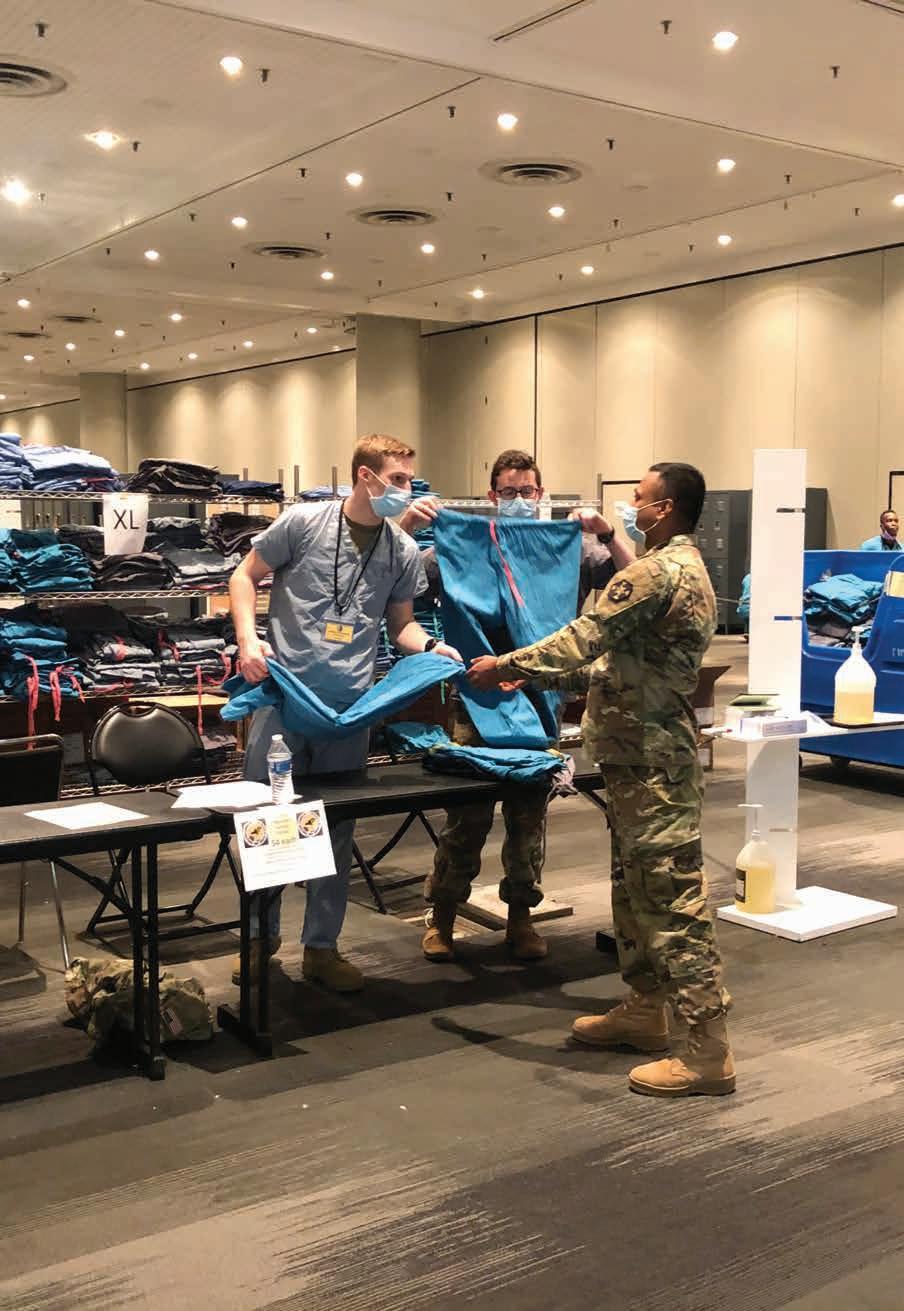
College jumps into the fight
College of Nursing Clinical Assistant Professor Wylie Dassie served on the front lines of the COVID-19 crisis in New York City, caring for patients in the hot spot with his Army Reserves unit.
Professor Serves in Coronavirus Hot Zone
URI College of Nursing Clinical Assistant Professor Wylie Dassie left the classroom for the hot zone this spring, traveling to New York City to serve on the front lines of the pandemic, caring for COVID-positive patients, and counseling soldiers and family members who lost loved ones to the virus.
At the beginning of the outbreak in the spring, Major Wylie Dassie was deployed along with his Army Reserve unit out of Brockton, Mass., to New York City, where the worst of the outbreak was spreading. “Operation Gotham” saw him and his unit faced with a convention center full of sick patients and orders to nurse as many as possible back to health.
“When we arrived, there were about 550 patients there, and some were very sick,” Dassie said of the city’s Javitz Center, where the team worked 12-hour shifts with no days off. “They said we would be done as soon as the patient load dropped below 100. We were done in about six weeks.”
The convention center was divided into pods of 20 patients, cared for by Dassie and his fellow nurses. Most of his patients were between 40 and 70 years old, and the seriousness of their symptoms varied wildly.
“One of the first patients I had was a woman who was just slumped over on a stretcher and was just shaking like she was having a seizure,” Dassie said. “That’s what sticks in my head the hardest. She didn’t die, but I had another patient who was the opposite. Came in walking and talking fine, and died about two days later. It was just crazy.”
As a member of a Combat Operational Stress Unit, Dassie had the additional duty of accompanying New York City police officers and medical
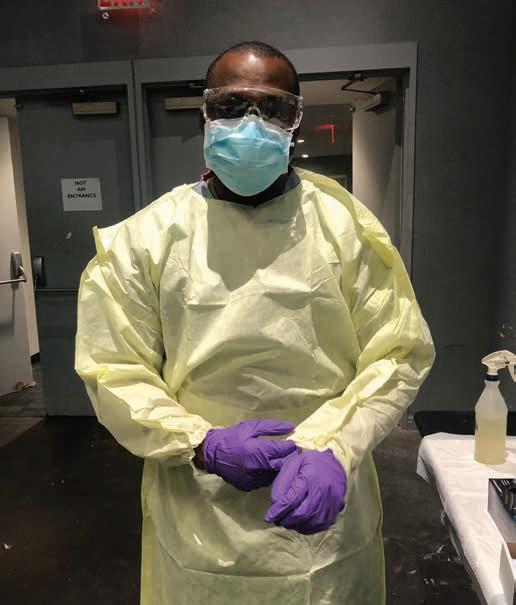
Wylie Dassie cared for patients with COVID-19 at the Javitz Center in. New York City during the height of the virus there.
workers to retrieve deceased patients who had died in their homes. He counseled family members in their homes, and fellow soldiers in the unit’s Behavioral Health Center.
“We helped the families and the soldiers dealing with death, talking to them about resources available and helping them get through it all,” Dassie said. “When you come off a 12-hour shift, you can talk to some people, destress, talk about some of your concerns, pick up some coffee. Just stuff that you wouldn’t think is a big deal, but it’s a huge deal.”
Dassie also served as a public relations officer for Urban Augmentation Medical Taskforce 3 of the 804th Medical Brigade, granting interviews to media members and serving as a liaison between the Army and the press. His multifaceted experience gave him a unique perspective on the scope of the fight against COVID-19.
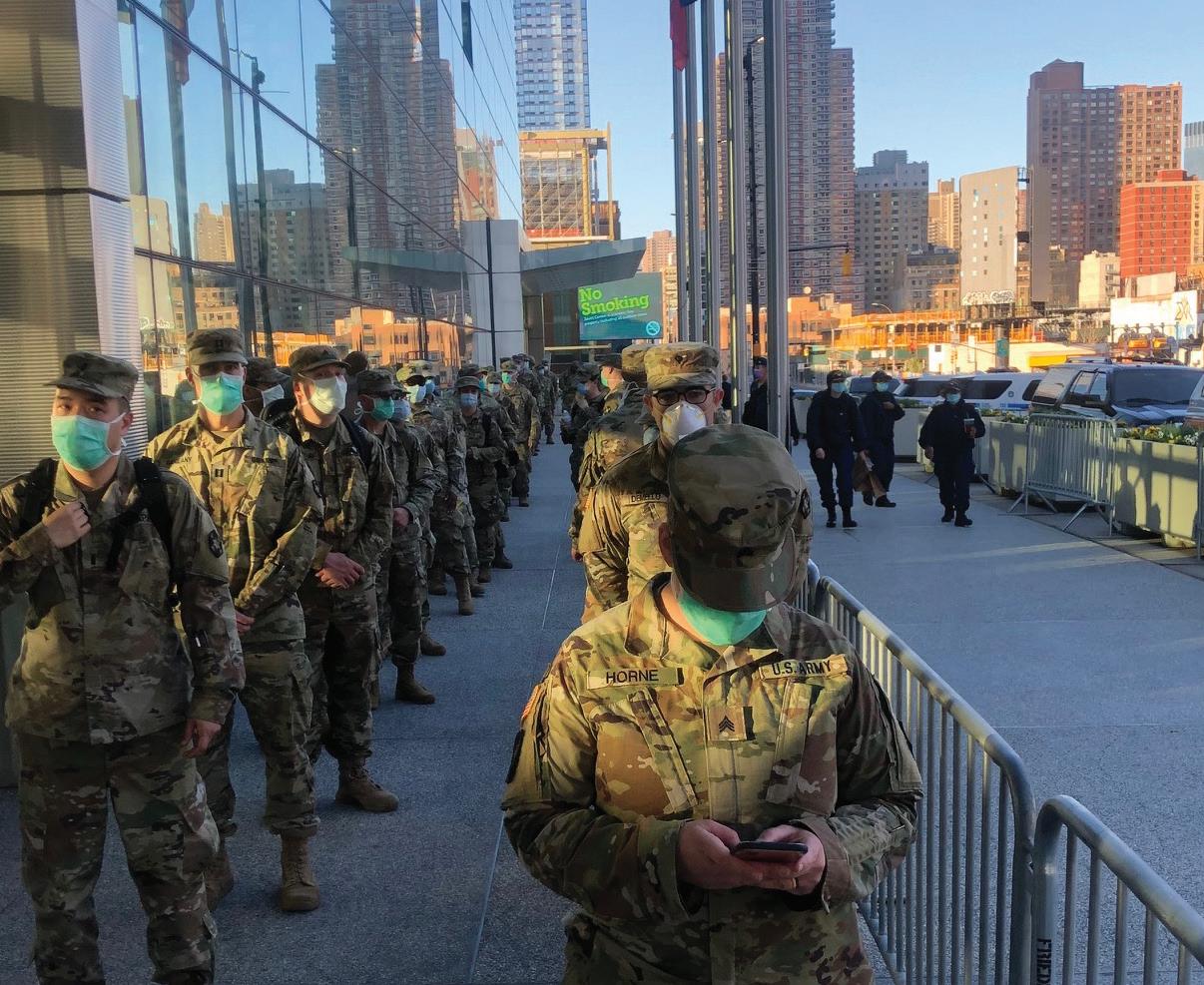
— Wylie Dassie
Soldiers from Major Wylie Dassie’s Army Reserve unit line up outside the Javitz Center in New York City, where they cared for patients with COVID-19 last a time when the city was the epicenter of the virus.
“This is a problem in America,” Dassie said of those who don’t take the pandemic seriously. “Some people take it as a joke or a political hoax. It’s not. If people followed the rules and did what they were supposed to, it wouldn’t be as bad as it is now. If more people were responsible, it would be a lot better.”
After six weeks caring for hundreds of ill patients, Dassie spent two weeks in quarantined isolation before being allowed to travel back to Rhode Island. But his work may not yet be done. After a regularly scheduled two-week training drill in August, Dassie was anticipating a call back to New York in the fall.
“The mission was an experiment to see how we would do it the next time,” Dassie said. “They said, ‘the mission was successful; you did the job. Be prepared to come back in September.’ That’s what we were told when we left. So I might be back.”
While battling an unknown enemy like the coronavirus is “terrifying,” Dassie said he wouldn’t hesitate to serve, and neither would most health care professionals.
“Nursing is a calling,” he said. “We all just jump in and do what needs to be done. We had people coming in from private practice and now all of a sudden they’re changing bedpans. It was a real change for a lot of the folks coming in because we needed bodies. It’s all for country.”
A URI nursing student has made an extraordinary effort to help during the COVID-19 crisis, collecting more than 5,000 medical grade masks from companies around Rhode Island and Massachusetts, and delivering them directly to front-line medical workers who need them most.
Meredith Arden, a student in the College’s Psychiatric Mental Health Nurse Practitioner Program, recognized early on in the coronavirus outbreak that personal protective equipment could be in short supply for frontline medical workers like her and her fellow nurses at Eleanor Slater Hospital in Cranston. So when she saw an opportunity to help, she jumped at it.
An anonymous donation of N-95 masks led to matching donations from multiple companies. Arden spent the next couple weeks driving around the two states, filling her car with more than 5,000 masks, which she donated directly to doctors and nurses at a time when PPE was hard to come by.
“If you see a need and you can meet that need, that’s what humanity is all about,” Arden said. “If there’s a way we can help and be humans, we have to find it in ourselves to make the biggest impact we can. I was glad I was able to help. Everyone really stepped up. It instills hope that even in these tenuous times, there are a lot of really wonderful people out there.”
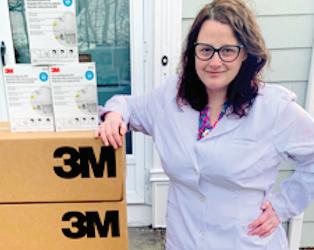
Faculty Member Helps Fill Key Role in COVID Fight
A URI Nursing professor helped fill a key role in the COVID-19 fight, working with the Rhode Island Department of Health to inform residents who have tested positive for the disease, advise them what to do next, and trace any and all contacts the patient has had with other people.
Clinical Assistant Professor Mary Cloud, who has a specialty in community health nursing, notified by phone patients who test positive, and discussed Professor Mary Cloud what they should do to keep themselves and family members safe. She reviewed the symptoms they were experiencing and their medical history, noting any chronic conditions that could worsen COVID-19. Cloud also collected demographic information and went through all of the patient’s close contacts.
“It’s important to understand what symptoms the person is experiencing now,” Cloud said. Cloud also served as a counselor of sorts when speaking to people feeling isolated and emotional. Through these calls, she was able to reach out and tell people that they’re not alone. “This was someone from the Department of Health reaching out and saying ‘We care about you, and we want to help you,” she said. “And I think that’s a very powerful message to give to every patient that we contact.”
Left, URI nurse practitioner student Meredith Arden collected thousands of N-95 masks for frontline health workers.
COVID-beds, COVID-IV poles
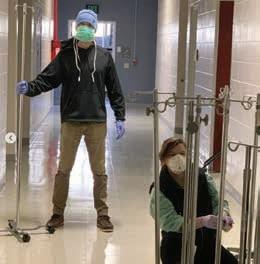
URI College of Nursing personnel pitched in to get beds and IV poles ready for hospitals around the state.
Education in the age of COVID-19
URI’s nursing students are successfully navigating the new “COVID normal.”
“With the support from professors, clinical instructors, family, friends, and colleagues, the transition to online learning was very manageable,” said Carly McNulty ’21. “We went from in-person lectures, clinical rotations, and face-to-face meetings to online lectures, demonstration videos, modules, Webex meetings, and emailing teachers and classmates.
“I completed different clinical modules for my psychiatric nursing clinical and family clinical Carly McNulty rotations, as well as the coursework. Although I wasn’t in person talking to patients and caring for them, I was still learning and progressing through the semester with ease.” Having just “My scholarship definitely completed her helped with tuition and third year, McNulty has supplies and decreased taken full my need for college loans.” advantage of the opportunities at URI. She works part time as a College of Nursing student assistant, is a Nursing Ambassador, a member of the Student Advisory Committee, a Sigma Theta Tau International Nursing Honor Society member, and a URI 101 mentor. In addition, McNulty is a certified nursing assistant working on the front lines in an assisted living facility in her hometown.
Faculty Volunteer at Health Department Call Center
A Rhode Island resident tested for coronavirus hadn’t yet received results, but felt she needed to go to work. Another spotted an operating dog groomer while taking a walk and wanted to know if they should be open. Still another was told to get tested but was scared by what a positive result could mean.
“I think she just needed someone to talk to, to support her,” said Clinical Associate Professor Patricia Stout about the worried caller. “That can be sort of our role, as well — being a support person. Sometimes, people just need someone to engage with.”
Stout is among a group of nursing faculty members from URI who volunteered with the RI Department of Health during the initial response to the coronavirus pandemic. Along with Professor Diane Martins and Assistant Professor Dahianna Lopez, Stout worked in the call center, fielding questions from concerned residents looking for critical information to help keep them safe during the pandemic. The volunteers answered the questions they could, referred callers to other resources they needed, or sometimes just lent an ear to residents worried about themselves and their families.
“For most people, I hadn’t sensed panic. I sensed more that they just didn’t know where to go to get answers,” Stout said. “That’s what we were there for. We weren’t trying to engage in any kind of consultation or anything. We were there to field calls, answer questions and give people the resources they need.”
Several URI Nursing students have dedicated themselves to helping during the COVID-19 health crisis we are all facing. Here, two of them relay some of their experience, in their own words:
Samantha Falkowski ‘21
My name is Samantha Falkowski and I am currently in my second to last semester at URI. I am working two frontline jobs, one as a patient care technician at South County Hospital in the Emergency Department, and the other as a customer service representative and cashier at Dave’s Marketplace in Coventry.
I started working at South County Hospital a year ago, and it has been so crazy seeing all of the new safety protocols in place and adapting to these scary times, especially in a setting that is already always highstress to begin with. I am very proud as a nursing student to be able to assist nurses and health care providers in the ED to continue to provide the best care and support.
I have worked for Dave’s Marketplace for almost 6 years, and it is shocking seeing all the new changes implemented to help the safety of the employees and customers. Dave’s has installed spit guards, added senior shopping hours and reduced store hours since the start of the pandemic.
I am proud to serve the state of Rhode Island in two aspects of an essential employee, one in the medical field and the other as a grocery store employee.
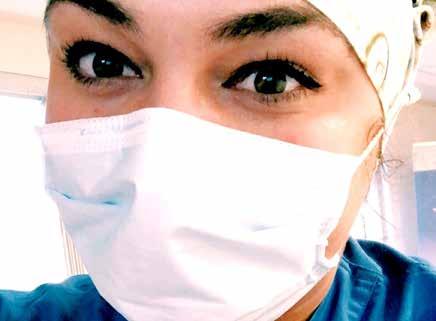
Bridget Montle ‘20
My name is Bridget Montle and I graduated from URI in May. Throughout the school year, I worked as a patient care technician in the Emergency Department at South County Hospital and as an EMT at Charlestown Ambulance Rescue Service.
Since the start of the pandemic, I have been picking up extra shifts to help out where I can on the front lines. Whether it is on the ambulance or in the ED, we are the first point of contact for many COVID-19 patients. This has definitely changed our day-to-day operations and how we go about patient care to ensure staff safety. On the ambulance, I’ve helped to make sure we have enough PPE in stock so that if we have a surge, we have enough to get us through. At the ED, I have been spending some time as a COVID-19 screener in triage, making sure patients who are symptomatic or at-risk flow through the ED properly.
I wasn’t planning on having my senior year cut short by a pandemic. But I’ve never been so proud to be on the front lines, making a difference every day. I have the most amazing coworkers at both South County Hospital and Charlestown Ambulance Rescue Service. The teamwork and resiliency my coworkers show lets me know we’re going to come out stronger on the other end of this. Stay safe!
Despite an economic downturn, alumni and friends remained loyal to the College of Nursing Annual Fund, contributing resources to move courses on-line, providing emergency support for displaced students and underwriting essential PPE for nurses and other frontline responders. Per capita generosity from our community has never been higher.






